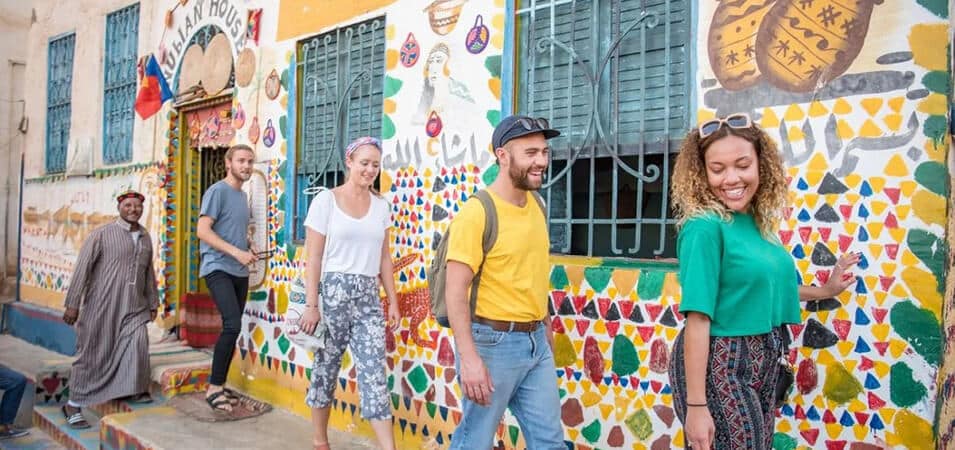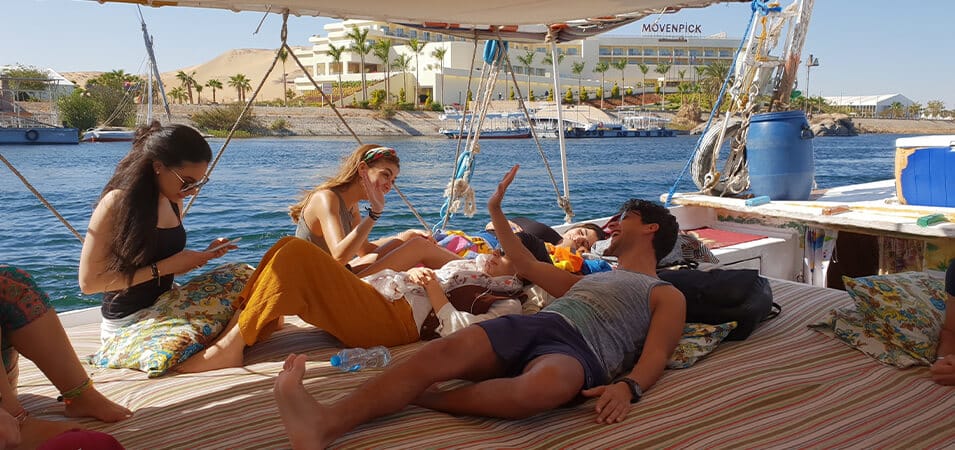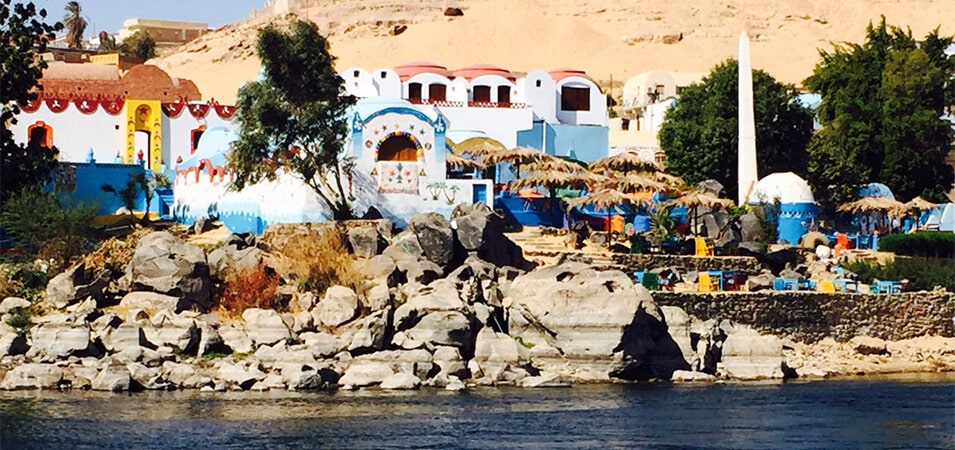The Nubian Villages in Aswan, Egypt, show how the Nubian people have a rich cultural past and a long history. These towns give a unique look into the traditional Nubian way of life, architecture, and customs on the Nile River’s banks. This piece discusses the exciting things about Nubian villages, what they mean, and what visitors can do there.
Don’t Miss checking out our Egypt Tour Packages.
The Nubian People: A Brief Overview
The Nubians are an ancient group of people who have lived in the area that is now Sudan and Egypt for thousands of years. They are strongly linked to their land and the Nile River, essential parts of their culture. Even though the Nubian people have faced problems throughout history, they have kept their customs, language, and traditions alive. This has made them a strong and vibrant society.
The Unique Architecture of the Nubian Villages in Aswan
The architecture of Nubian towns is one of the most noticeable things about them. The houses are mud bricks and have elaborate designs on the outside. The buildings have dome-shaped tops and brightly colored geometric patterns on the walls. These designs not only make the towns look nicer, but they are also helpful, like keeping the houses cool in the hot desert.

Vibrant Colors and Patterns of the Nubian Villages in Aswan
Color is an integral part of the Nubian culture; you can see it everywhere in their towns. Nubian homes’ walls, doors, and windows are painted in bright colors like blue, yellow, green, and red. These colors have meanings that show how connected the Nubian people are to their surroundings. They represent the river, the sky, and the fertile lands. Many detailed patterns are based on nature, animals, and geometric shapes, making for a fascinating look.
Traditional Nubian Cuisine of the Nubian Villages in Aswan
When you go to the Nubian towns, you can taste the natural flavors of Nubian food. Nubian food is known for its intense flavors and use of products from the area. The most common foods are ful medames (fava beans), ta’meya (Egyptian falafel), and kisra (sourdough flatbread). Visitors can taste this old culture’s delicious food by eating traditional meals in Nubian homes or restaurants.
Nubian Hospitality and Cultural Experiences
Hospitality is a big part of the Nubian culture, and village people are always happy to see tourists. Nubians offer a place to stay and share stories, songs, and dances that have been passed down from generation to generation. Travelers can participate in cultural activities like painting with henna, listening to traditional music, and participating in local celebrations. These meetings give you a natural look at how the Nubians live.
Preservation Efforts and Challenges of the Nubian Villages in Aswan
It is imperative to keep the Nubian villages and their traditional heritage alive. In the past, the building of the Aswan High Dam, which flooded their ancestral lands, forced many Nubian groups to leave their homes. But people have tried to move and rebuild the villages to keep Nubian practices and customs alive. There are still problems, like the growth of cities and the need for sustainable development while preserving the towns’ cultures.

Boat Tours on the Nile
A boat tour on the Nile River is often the best way to see the Nubian towns. As people cruise the calm waters, they can look at the beautiful scenery, watch the local fishermen in their traditional boats, and see the beautiful nature around the towns. The boat tours are calm and relaxing, allowing people to connect with nature and see the Nubian way of life differently.
The Beauty of Nature: Aswan’s Surroundings
- Aswan is the gateway to Nubian communities and is stunningly beautiful. Aswan has historical attractions and stunning scenery, from Elephantine Island to the Philae Temple. The Nile River’s natural splendor near Aswan is breathtaking. Famous natural sights in Aswan include the Philae Temple. The Nile River and rich flora surround this historic temple island. Boats take you to the temple, offering spectacular views of the river and surrounding area. The Philae Temple shows how ancient Egyptians lived and cooperated with nature.
- Elephantine Island is another Aswan natural wonder. Elephant Island, named for its elephant-like shape, is gorgeous. A tranquil atmosphere is also recognized. Walk along its shores to witness a wide river vista, graceful sailboats, and local fishermen at work. The island’s peaceful and stunning scenery is an excellent spot to contemplate and relax. The Aswan Botanical Garden, or Kitchener’s Island, is magnificent. This lush oasis has unusual vegetation, brilliant flowers, and tall palm trees. People can walk around the twisting walkways, admire the beautiful flora, and enjoy the pleasant shade from the trees and plants. The botanical garden’s tranquility lets people escape the city and reconnect with nature.
- For nature enthusiasts, Aswan must have a Nile River felucca trip. Traditional ships allow people to cruise the river slowly and comfortably, taking in Aswan’s lovely surroundings. The gentle air, lapping water, and spectacular riverbank views create a peaceful and lovely ambiance. The neighboring deserts offer a unique experience for the riskiest outdoor activities. Treks and camel rides are available in Aswan, which borders the Sahara Desert. Exploring the golden sands, realizing the desert’s size, and watching the dune’s sunset will stay with you.
Local Crafts and Souvenirs of the Nubian Villages in Aswan
The villages of the Nubian people are known for their fine craftsmanship, and tourists can buy unique souvenirs and items made by hand. Skilled craftspeople make elaborate pottery, handwoven fabrics, colorful rugs, and unique jewelry, showing the Nubian people’s creativity. Buying these items made in the area helps the local economy and gives tourists a piece of Nubian culture to remember.
The Nubian Museum
The Nubian Museum is a great place to learn more about the history and customs of the Nubian people. The museum is in the city of Aswan. It has many items, such as ancient pottery, jewelry, and sculptures. The exhibits tell the story of the Nubian people and show what they did in art, building, and business. Exploring the Nubian Museum is a great way to learn more about the rich history and culture of the Nubian people.
Traditional Festivals and Celebrations
Festivals and celebrations in Nubia are lively and happy times that show how deeply rooted the community’s customs are. Festivals like “Soyat” and “Ras Assana” have traditional music, dances, and acts that show how lively the Nubian people are. These events are a great chance for tourists to see the colorful costumes, listen to the rhythmic drumming, and join in the fun, creating memories that will last a lifetime.

FAQs to the Nubian Villages in Aswan
How do I reach the Nubian Villages in Aswan?
You can take a cab or a felucca boat to the Nubian Villages from Aswan City. Many tour companies give trips to the villages.
Are there accommodations available in the Nubian Villages?
Some guesthouses and lodges look like the Nubians built for people who want to spend the night in the towns. It is best to book beforehand, especially during busy travel times.
Can I hire a local guide in the Nubian Villages?
Hiring a local guide is a great way to improve your time in the Nubian Villages. They can tell us much about the Nubian people’s history, culture, and customs.
What is the best time to visit the Nubian Villages?
The best time to go is from October to April when the weather is more relaxed and pleasant. But the towns can be seen at any time of year, and each season has its charm.
Are there any restrictions or customs to know while visiting the Nubian Villages?
When you go to the Nubian Villages, it’s important to follow the customs and traditions of the people there. Dress modestly, ask permission to take pictures of people, and be aware of local customs to ensure your trip is respectful and fun.
Conclusion
A trip to the Nubian Villages in Aswan, Egypt, is a great way to learn about culture. From the unique buildings and bright colors to the friendly people and old traditions, these towns give you a whole look at the Nubian way of life. Visitors will remember this fascinating place for a long time if they learn about the Nubian culture, eat traditional food, and take part in cultural activities.
Don’t Miss checking out our Related Article :
